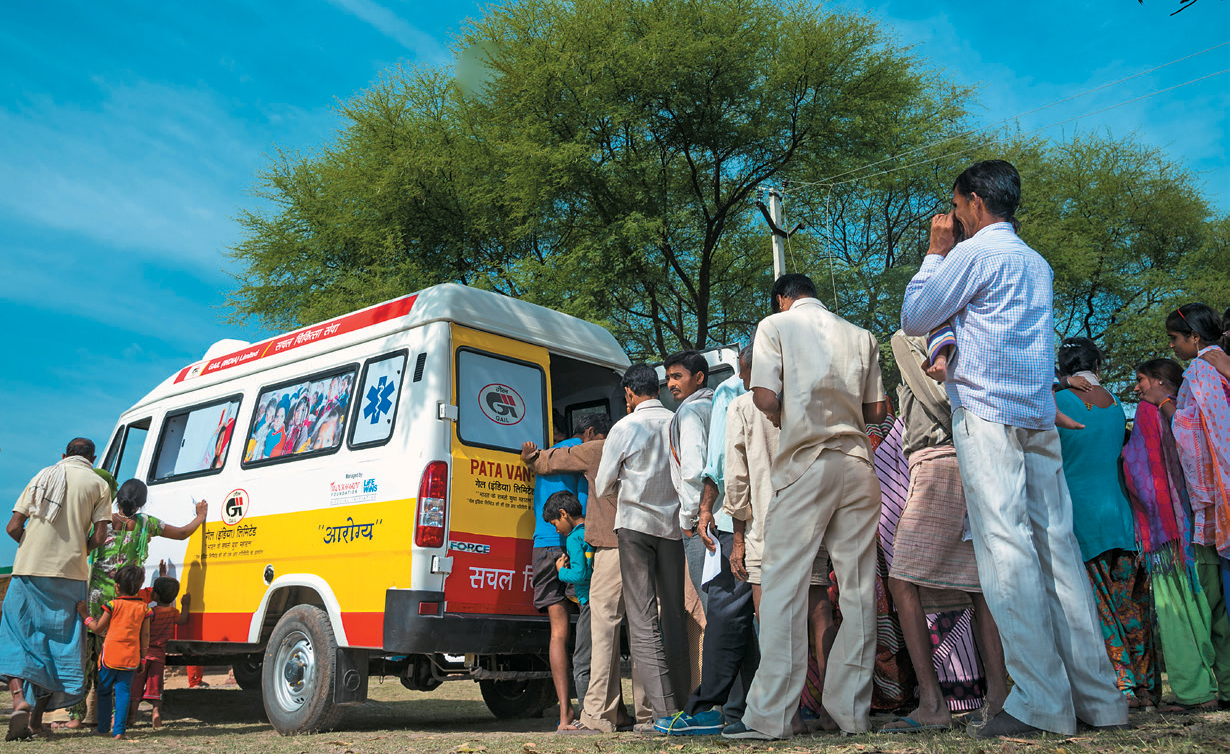
BUILDING A BETTER TOMORROW
Gas Authority of India Ltd. (GAIL)
GAIL (India) Limited believes in the philosophy that our actions today shape our
tomorrow.Since 1984 GAIL has been working with the twin mission of ensuring
sustainable energy and growth. The mission statement is summed up by GAIL
(India) Limited's Chairman and Managing Director Shri. B C Tripathi: “In a
changing landscape of consumer aspirations amidst a milieu of alternatives, GAIL
is reinventing strategy and services to ensure growth of natural gas consumption
in India’s energy basket for supporting Government of India’s twin mission of
ensuring sustainable energy and growth.
Long-term sustainability also implies a direct commitment to the communities,
and a need to incorporate Corporate Social Responsibility (CSR) into business
processes and operations. Only this can maximise a company’s, or India Inc’s,
impact on the society. GAIL touches the lives of over three million poor people
through its various development initiatives.The company’s core CSR activities
revolve around socio-economic concerns like health and education;
economic-social issues such as women empowerment, skill development, and
environment; and largely social concerns like care for the elderly and
differently-abled.
As a responsible business firm in India, GAIL had a structured CSR programme as
early as 2001 -02. Later, following the government guidelines, GAIL annually
began spending upward of 2% of the average net profit made during the three
immediately preceding financial years, on judiciously chosen and meaningful
welfare projects for the benefit of stakeholder communities.GAIL’s CSR effort is
to enhance value creation in the society and larger communities –a critical
component in the Maharatna's philosophy.
This public sector major has identified seven broad areas of CSR interventions,
each of which is titled by the objective they seek to achieve. (Refer Graphic)
GAIL adopts a multi-stakeholder approach, collaborating with communities,
governmental and non-governmental organizations, academic institutions and
others, in an effort to identify emerging issues, developing projects and
effectively responding to challenges.
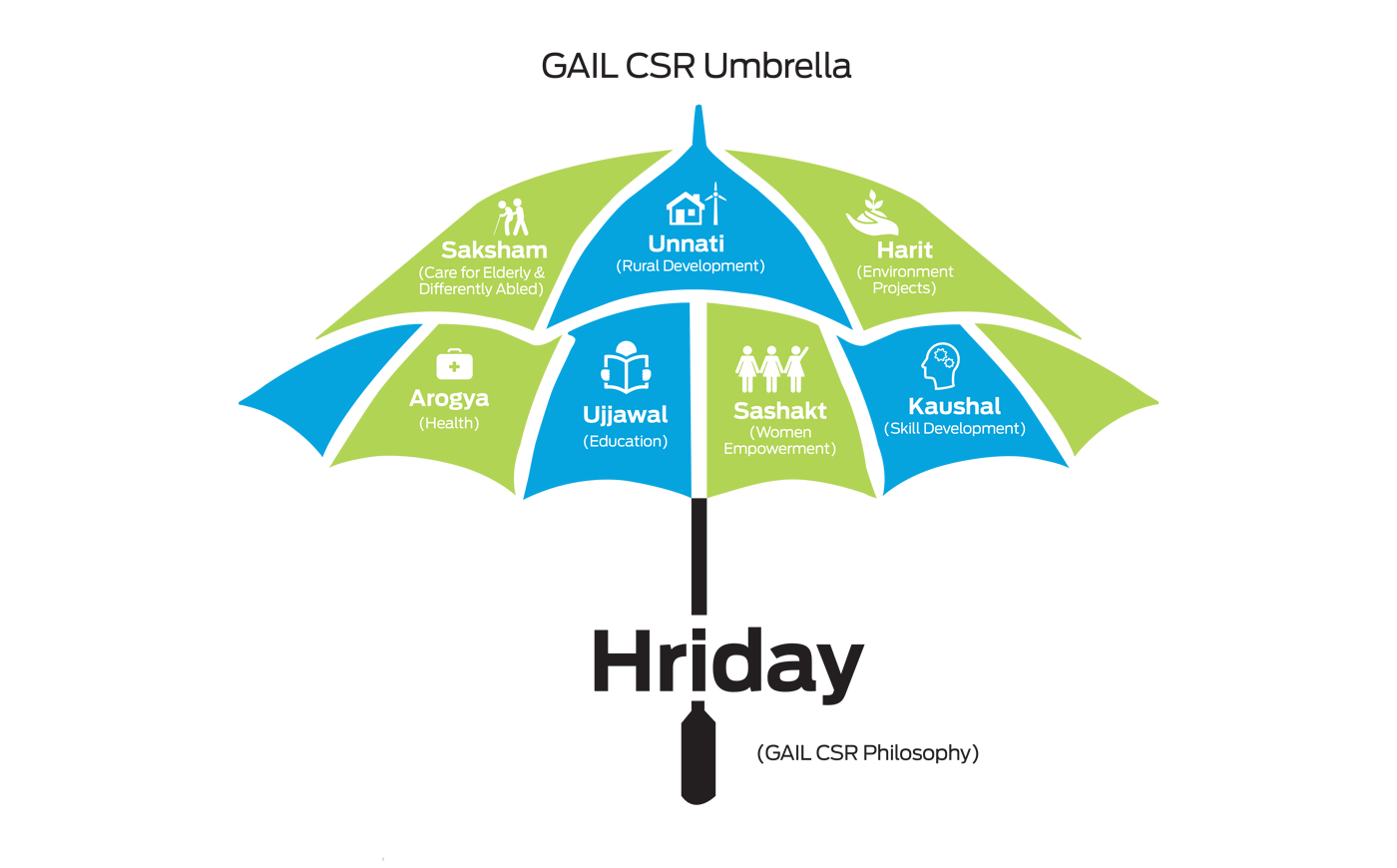
Arogya (Wellness): Nutrition, Health and Sanitation and Drinking Water projects;
Ujjawal (Towards a Bright future): Education initiatives;
Kaushal (Skill):Livelihood Generation and Skill development initiatives;
Unnati (Progress): Rural Development;
Sashakt (Empowerment): Women Empowerment initiatives;
Saksham (Capable): Care of the elderly and differently-abled;
Harit (Green): Environment-centric initiatives.
GAIL's commitment to ensure that the CSR objectives are achieved in letter and
spirit is demonstrated in the best practices it has adopted in identifying,
implementing, sustaining and monitoring its CSR interventions to maximize
sustainability, scalability, and transparency.
To make its CSR efforts more effective and tangible for the targeted
beneficiaries, a long-term commitment and measures for self-sustainability are
interwoven in the design of major projects. Some of the key initiatives
undertaken under the CSR umbrella are listed here:
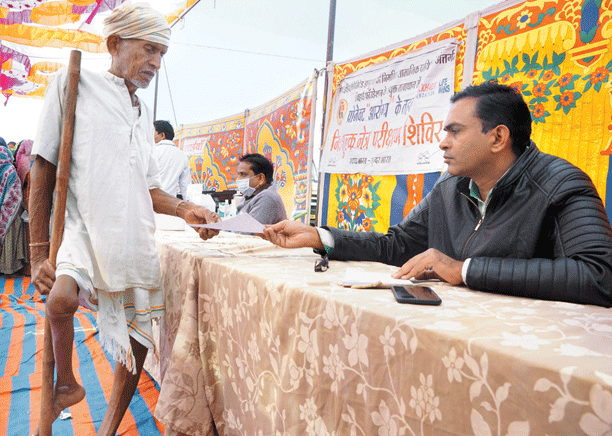
In an attempt to support efforts of the government to improve health,
sanitation, water, and nutrition schemes under implementation, in December
2007, GAIL conceived Project Arogya to provide free primary healthcare
services at the doorstep of people living in rural areas, particularly
inaccessible regions.
GAIL deployed the Mobile Medical Units (MMUs) in inaccessible and remote
areas of various states, taking healthcare to the most needed and
underprivileged sections of our society. With each passing year, GAIL
upgraded the facility to more and more districts and states. Today, the
Project proudly supports 56 such MMUs covering 12 states.
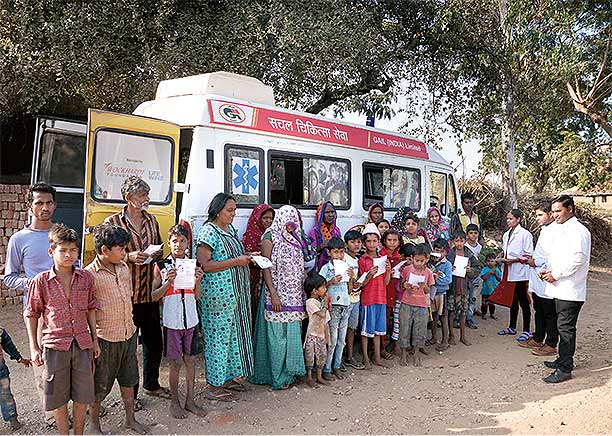
The Arogya programme has reached out to over 2 million people in the last 11 years
These MMUs are placed in 40 carefully
chosen districts of the country. Through Arogya around 2 million poorest of
poor and destitute have benefitted with their basic healthcare requirements.
The programme covers states such as Andhra Pradesh, Assam, Bihar, Delhi,
Gujarat, Jharkhand, Madhya Pradesh, Odisha, Punjab, Uttar Pradesh,
Uttarakhand, and West Bengal.
Each Arogya MMU includes a qualified MBBS Doctor, Nurse (ANM), Lab
Technician/Pharmacist etc. The Unit carries essential medicines, diagnostic
kit and information and awareness material on health and hygiene.
A single MMU covers 5-8 villages per week and provides primary health services to approximately 27,000 patients annually. All the MMUs are GPS-enabled and geo-fenced, for remote monitoring and supervision. MMUs also carry out awareness activities on health and hygiene to promote better health behaviour among the villagers and communities.
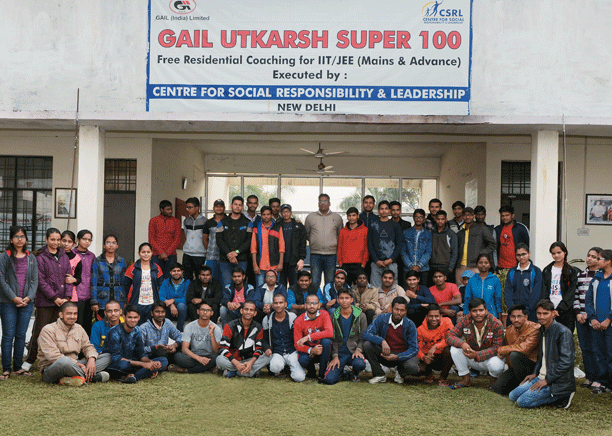
Utkarsh Super 100 students at Kanpur
The progress of any country depends on the literacy and education of its masses. An educated society is imperative to put the country in the orbit of growth, and thereby lifting the people out of the misery of poverty and sufferings.The flagship programme, GAIL Utkarsh, launched in 2009, has already completed nine successful batches. In the last ten years, the programme has transformed 939 young lives. The success of Utkarsh can be gauged from the fact that it has not remained an island of success for GAIL, but has set a benchmark for many others to follow. Expanding the scope of the programme, GAIL has now taken it beyond Kanpur (Uttar Pradesh) to Dwarahat and Srinagar (Uttarakhand).
The carefully set up programme selects students through a rigorous process involving visiting local government-run schools and sensitising the students, teachers, and principals of these schools. After publicising about the programme, all students are assessed by way of a written test and personal interviews. The experts and faculty are given free hand to select the meritorious students from the underprivileged sections of the society. The programme is exclusively for the disadvantaged and only those children whose parental income is below Rs 2.50 lakh per annum are given admission. The selected students are provided all-expense paid, specialised one-year free residential coaching/intensive mentoring. Keeping in view the requirement of these students, they are offered motivational and leadership development classes. These Centres have a modern computer lab, and the selected students are also provided academic materials, like books and magazines free of cost.
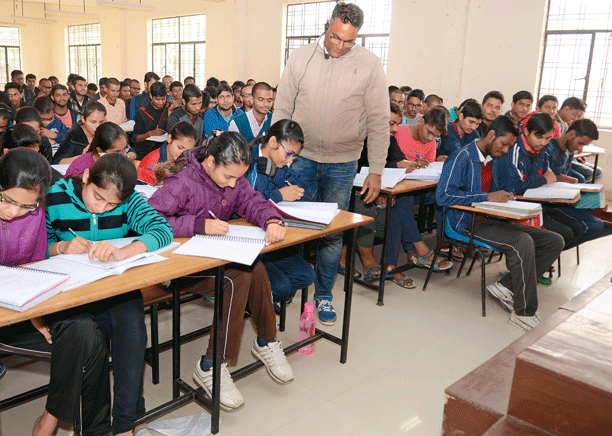
Preapring the minds to Excel in competitions and life: Utkarsh provides the right platform
In 2013, a catastrophic flash flood in Uttarakhand wreaked havoc and completely destroyed Rudraprayag valley. Responding to the crisis, GAIL conceived Project Shrijan (Creation) to extend long term support to the affected community in an integrated manner, adopting a multi-sectoral and multi-hazard approach. The project aimed at rehabilitation of 10 villages of Rudraprayag district of Uttarakhand to help the inhabitants to return to normalcy along with the overall objective to help minimize loss to life and property in the event of any future natural disaster.
The project addressed key issues of rehabilitation
of communities, encouraging disaster-proof construction technologies, livelihood
sustenance and enterprise,
increasing awareness about emergency response and
facilitating other mitigating services for disasters. Since inception, the project
has touched the lives of over 23,000 people directly and indirectly.
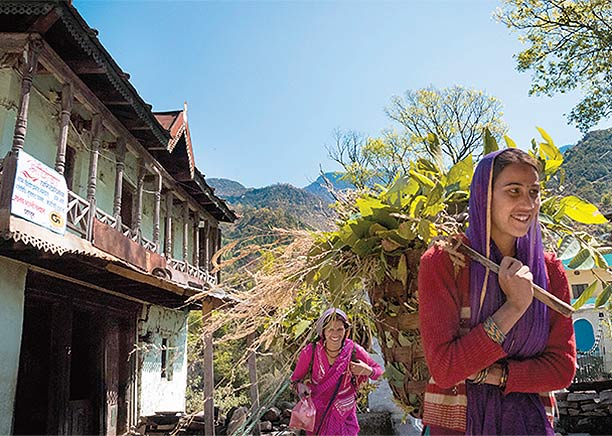
The Shrijan programme has been instrumental in developing and rebuilding Uttarakhand after the devastating floods in 2013
Skills training in 28 vocations has been imparted to over 7,000 individuals. Three Community Resource Training Centres (CRTCs) have been established wherein various income generation units such as spice making, juice making, bakery, etc. have been set up. Activities like training in usage of disaster resistant construction technology, construction of disaster-resistant homes and emergency shelters, mock drills, distribution of disaster relief kits, provision of toll-free helpline, fully-equipped disaster response vehicle and development of evacuation plans for villages, duly approved by District Disaster Management Authority, have been undertaken.Rain Water Harvesting structures have been constructed and training in the construction of water-powered grinding units (Gharaat) undertaken to decrease dependence on conventional sources.
Training programmes have been conducted on environment conservation, climate change, etc. Audio-visual aids such as radio shows, wall paintings, banners, and other IEC material are being used on a regular basis. Tailoring and handloom weaving have emerged as the most popular courses among women, who can pursue sustainable and independent employment.
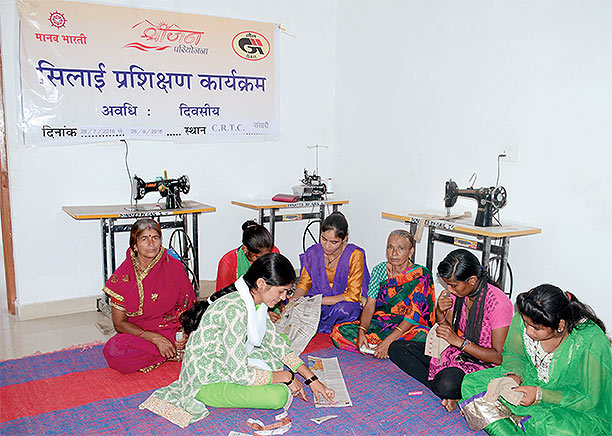
Handloom weaving and tailoring are the most popular training courses offered by Shrijan
Under handloom training, the women are
taught to spin the yarn, create fabric, and then cut and design it. The
handloom weavers are provided four-month training. The final products are
sold through the CRTCs. The trainees, on occasion, receive small orders from
different parts of the districts for which they are allowed to charge a
nominal amount.
Workshops are held at the village and block levels to
create awareness against domestic violence and against alcoholism.
Training in handling auto woollen garment machine in CRTC Lawdi is underway,
while organic rooftop café at CRTC Ukhimath is generating revenue and making
the project sustainable.
Plans are also afoot to establish a sanitary
napkin unit to address women’s hygiene issue and providing packaging and wrapping
training to beneficiaries for marketing the products manufactured at CRTCs. Work to
install solar street lights in villages is afoot, besides establishing sales outlets
in Dehradun and GAIL’s residential colony in Noida.
The project has garnered many
awards and accolades, the most recent being India CSR Award 2018, by India CSR
Network.
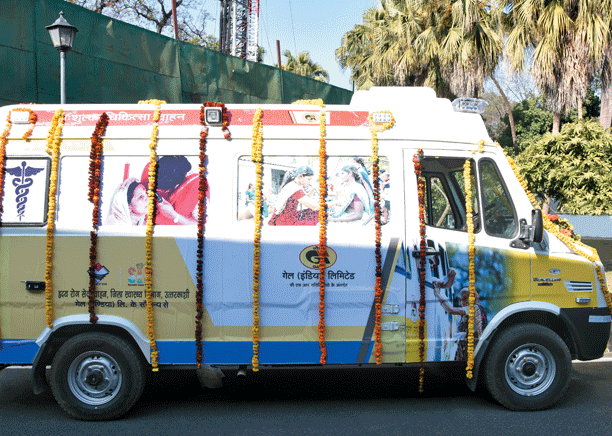
Gail's Cardiac Care Mobile Medical Unit (CCMMU), for operating at Barkot and Janki Chatti
Swachh Iconic Places (SIP) is a special
initiative focused on select iconic heritage, spiritual and cultural places.
SIP is a unique initiative envisioned by the Prime Minister, launched under
the Swachh Bharat Mission.
The programme is guided by the Ministry of
Drinking Water and Sanitation, Government of India. Through the programme
special and laudable cleanliness, sanitation and hygiene efforts are
undertaken to maintain and improve the areas surrounding Iconic places.
In the first phase of the programme launched in 2016, entrusting faith and
confidence in GAIL, Taj Mahal, Agra was assigned to the company.
Around Taj Mahal, GAIL is involved in municipal solid waste
management,street sweeping, door-to-door segregated waste collection, underground
dustbins, bio-compost plants, smart e-toilet and bottle-crushing machine etc.
Echoing trust and confidence in this Maharatna , GAIL was assigned the task of
enhancing cleanliness at the Yamunotri shrine, a popular pilgrim spot in SIP-II. To
begin with, the company set up wireless internet network-based CCTV on the pilgrim
route.
The company made further efforts to improve the facilities at Yamunotri for the
yatris by providing
a) Cardiac Care Mobile Medical Unit (CCMMU);
b) Setting up of Heart Care Centre (CCICU);
c) Offering Support Services en-route the Yatra.
The Cardiac Care Mobile Unit (CCMU), along with the medical support system, is fully
armed with modern and specialised equipment. The Unit is air-conditioned and is
specially fabricated for patient handling and medical emergency and support. The Van
is equipped with modern equipment like: Transport Ventilator, Bi Phasic
Defibrillator with ECG and Multi-channel Multi-Para Monitor.
This specially equipped Van provides emergency care to pilgrims. Also a Cardio Care
ICU (CCICU) is being set up at Barkot en route to Yamunotri.




